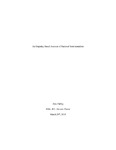An Empathy Based Account of Rational Sentimentalism (thesis)

View/
Author
Farley, Alex
Subject
Washington and Lee University -- Honors in Philosophy
Social Intuitionist Model (SIM)
Empathy
Sentimentalism
Decision making -- Moral and ethical aspects
Metadata
Show full item recordDescription
Alex Farley is a member of the Class of 2019 of Washington and Lee University. Thesis; [FULL-TEXT FREELY AVAILABLE ONLINE] This project is an attempt to argue two things: first, that the Social Intuitionist Model can be used to advance forward a rational sentimentalist framework, and second, that empathy is necessary for both the existence and proper functioning of the Social Intuitionist Model. With the first argument, this project draws on two concepts, Haidt and Bjorklund's Social Intuitionist Model [SIM] and D'Arms and Jacobson's rational sentimentalism. . . .
The second argument I make is to show how empathy is both necessary for the existence of the SIM itself, and by relation a rational sentimentalist view, and how it is necessary for the proper functioning of the SIM. . . . The second part of this argument is where my paper takes a normative turn. Whereas previously I had been describing how the SIM and empathy function together, in the next part I argue for the use of empathy in order to improve our moral decision-making process. This normative argument develops from the fact that empathy is necessary for our SIM to function properly as without empathy, individuals are unable to properly revise their intuitions. Since empathy is necessary for this revision process of our intuitions, I argue that individuals should strive to be what I call "properly empathetic" in all situations. Finally, I describe how individuals can work to cultivate and improve their empathic abilities. [From Introduction]